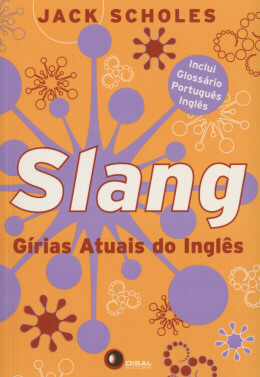TEACHING AND LEARNING SLANG
According to David Crystal, “slang is one of the most vital elements in the life-blood of language, and today the importance of slang is increasingly recognized. People have begun to appreciate its central role in everyday life.” (Foreword to – Slang - Gírias Atuais do Inglês)
Major changes in society have affected the way we use language, and slang and colloquial words and expressions are now accepted much more as part of everyday speech. Even words that were previously considered taboo are now often heard in films, TV programmes and in informal conversation.
Slang is also important because slang is power. Teaching and learning modern slang is a stimulating and enjoyable way to empower learners by enriching and expanding ways to make meaningful, fluent communication in English.
A few tips for teaching slang
• Be careful not to bombard students with too many new words at a time.
• Most learners need to come across new words several times before they become part of their active vocabulary.
• Encourage learners to find the equivalent in Portuguese and record these in a slang notebook, which they can use for revision.
• Research has shown that one of the most powerful means of acquiring vocabulary is to create connections and make new networks in the brain. This happens when students are involved in problem-solving tasks, interacting with you or others to solve puzzles, quizzes or problems of meaning.
• Students always learn best when they are enjoying what they are learning and when there is a challenge. Motivating, fun activities can be used to present new slang words and expressions, as fillers between other activities, to change or lighten the pace, at the beginning of the class as a warm-up and to create motivation, at the end to round things off nicely, to give as homework, or if you just run out of material and need something from your grab bag.
Here’s an example:
Familiar words – new meanings
The slang words and expressions on the left all come from existing, familiar words, but colloquially they also have an extra, new meaning. Match these words with the correct translation or explanation in Portuguese on the right. The first one, which is very easy, has been done for you. You’ll find all the correct answers at the very end of this post.
1
|
G
|
a piece of cake
|
A
|
improvisar
|
2
|
to have a bun in the oven
|
B
|
ter um chilique
| |
3
|
out to lunch
|
C
|
reclamar
| |
4
|
to go postal
|
D
|
algo muito difícil
| |
5
|
to wing it
|
E
|
estar grávida
| |
6
|
a killer
|
F
|
bater papo
| |
7
|
to rat on somebody
|
G
|
algo muito fácil
| |
8
|
to have kittens
|
H
|
enlouquecer
| |
9
|
to shoot the breeze
|
I
|
maluco
| |
10
|
to beef
|
J
|
dedurar
|
For lots more fun activities, check out this Slang Activity Book:
And for books on slang with translation and explanations in Portuguese:

Jack Scholes has a first degree in German/Russian from Liverpool University, a Post-Graduate Certificate in Education and EFL from London University, and he is also a Licensed Master Practitioner of Neuro-Linguistic Programming. He has over 40 years experience in ELT and is now a freelance writer, trainer and ELT specialist.
ANSWERS
1
|
2
|
3
|
4
|
5
|
6
|
7
|
8
|
9
|
10
|
G
|
E
|
I
|
H
|
A
|
D
|
J
|
B
|
F
|
C
|



